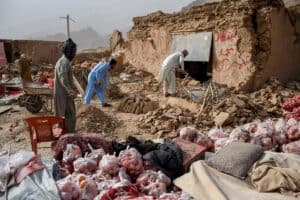China confirmed a tweet from a Taliban spokesman hours earlier, indicating that Beijing will keep its embassy in Kabul open.

The Taliban are due to form a government within days despite fighting in Afghanistan’s Panjshir Valley Friday where forces battling the hardline Islamists say they are enduring “heavy” assaults.
The Taliban face the enormous challenge of shifting gears from insurgent group to governing power, days after the United States fully withdrew its troops and ended two decades of war.
But they are still battling to extinguish the last flame of resistance in the Panjshir Valley — which held out for a decade against the Soviet Union’s occupation and also the Taliban’s first rule from 1996-2001.
Fighters from the National Resistance Front — made up of anti-Taliban militia and former Afghan security forces — are understood to have significant weapon stockpiles in the valley, which lies around 80 kilometres (50 miles) north of Kabul.
But on Friday pro-Taliban Twitter accounts aired video clips purporting to show the new regime’s fighters had captured tanks and other heavy military equipment inside the valley.
This video is no longer available.
The claims could not be independently verified.
While the West has adopted a wait-and-see approach to the group, there were some signs of engagement with the new leaders gathering pace.
China confirmed a tweet from a Taliban spokesman hours earlier, indicating that Beijing will keep its embassy in Kabul open.
“We hope the Taliban will establish an open and inclusive political structure, pursue moderate and stable domestic and foreign policy and make a clean break with all terrorist groups,” foreign ministry spokesman Wang Wenbin said.
The United Nations said it had restarted humanitarian flights to parts of the country, linking the Pakistani capital Islamabad with Mazar-i-Sharif in northern Afghanistan and Kandahar in the south.
The country’s flag carrier Ariana Afghan Airlines resumed domestic flights on Friday, while the United Arab Emirates sent a plane carrying “urgent medical and food aid”.
Western Union and Moneygram, meanwhile, said they were restarting money transfers, which many Afghans rely on from relatives abroad to survive, and Qatar said it was working to reopen the airport in Kabul — a lifeline for aid.
This video is no longer available.
– Threat of humanitarian disaster –
Even before the Taliban’s lightning offensive, Afghanistan was heavily aid-dependent — with 40 percent of the country’s GDP drawn from foreign funding.
The UN has warned 18 million people are facing a humanitarian disaster, and another 18 million could quickly join them.
Qatar said it hopes to see the establishment of humanitarian aid corridors at Afghan airports within 48 hours, Doha’s envoy to Afghanistan told Al Jazeera Friday.
The new rulers have pledged to be more accommodating than during their first stint in power, which also came after years of conflict — first the Soviet invasion of 1979, and then a bloody civil war.
That regime was notorious for its brutal interpretation of sharia law, and its treatment of women, who were forced inside, deprived of access to school and work, and denied freedom of movement.
This video is no longer available.
This time round, the Taliban have made repeated declarations that they will not carry out revenge attacks on opponents, women will have access to education and some employment.
They have promised a more “inclusive” government that represents Afghanistan’s complex ethnic makeup.
British Foreign Secretary Dominic Raab said, during a visit to Pakistan, that the international community must test the Taliban on their “sincerity” and “see whether they can deliver”.
The European Union on Friday also laid out its conditions for stepping up engagement with the Taliban, agreeing to establish a joint Kabul “presence” to help Afghans depart if security allows.
– Women’s protest –
Speculation is rife about the makeup of a new government, although a senior official said this week that women were unlikely to be included.
In Kabul, some 30 women took to the streets to demand the right to work and inclusion in the government — a day after several dozen women held a similar protest in the western city of Herat.
Women’s rights were not the only major concern in the lead-up to the Taliban’s announcement of a new government.
In Kabul, residents voiced worry over the country’s long-running economic difficulties, now seriously compounded by the hardline movement’s takeover.
This video is no longer available.
“With the arrival of the Taliban, it’s right to say that there is security, but business has gone down below zero,” Karim Jan, an electronic goods shop owner, told AFP.
On Friday, Ali Maisam Nazary, a spokesman for the Panjshir resistance who is understood to be outside the valley but in close contact with key leader Ahmad Massoud, said there had been more attacks by Taliban forces overnight.
“There is heavy fighting,” Nazary said. “He (Massoud) is busy defending the valley.”
Massoud is the son of the late guerrilla commander Ahmad Shah Massoud, dubbed the “Lion of Panjshir” for holding out first against Soviet and then Taliban forces when they were in power before.
But there were signs of normality in Kabul on Friday, where a near-full house turned out to watch Afghanistan’s top cricketers play in a trial match, with Taliban and Afghan flags waving side by side in what witnesses described as a show of national unity.






